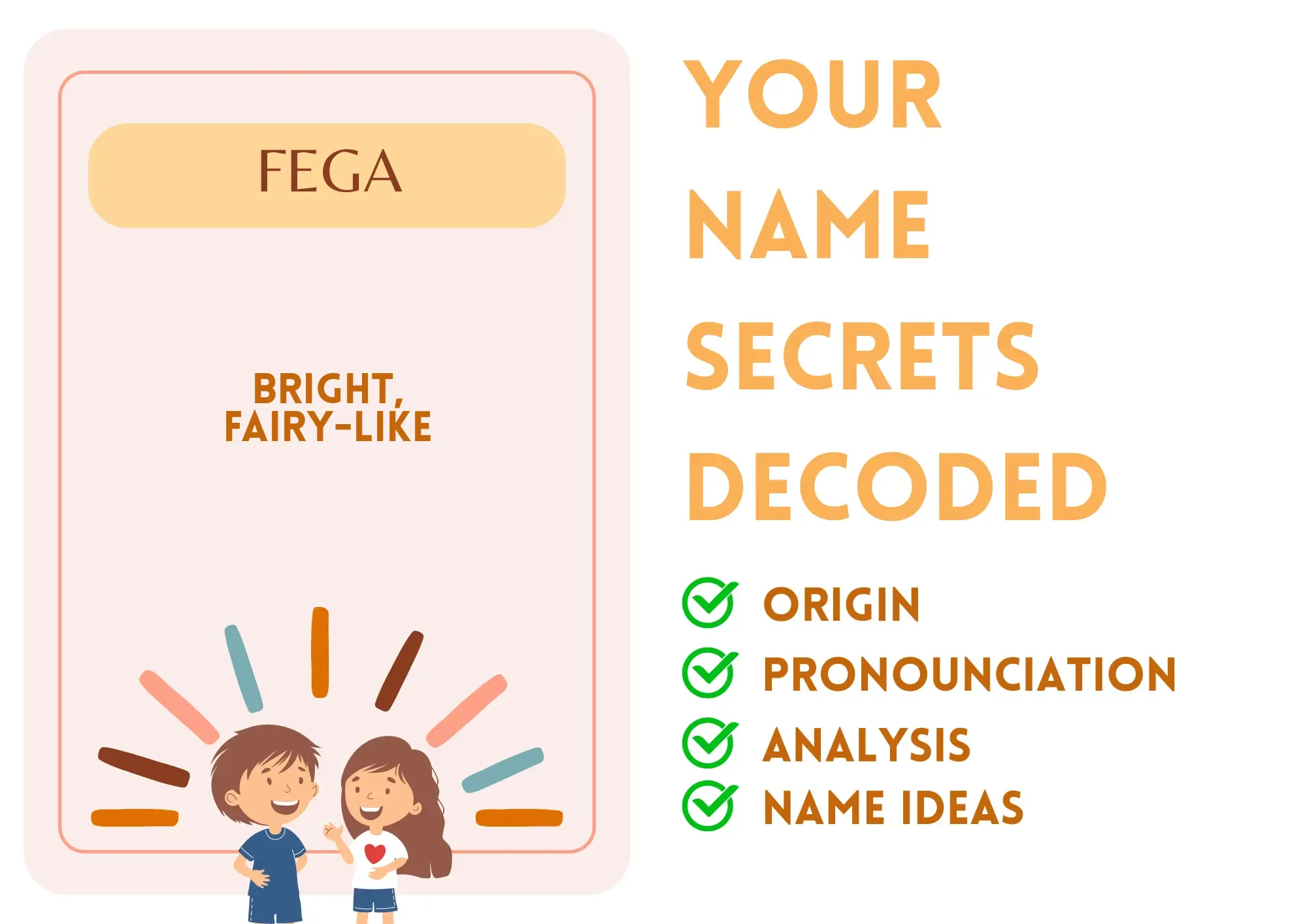
Fega
Fega is a unique and mystical name that carries an aura of charm and whimsy. While not widely recognized, it resonates with creativity and individuality, making it an attractive choice for parents seeking something distinct. Its origins seem to be rooted in unclear etymology, but it has connections to various cultures where it is interpreted as meaning 'bright' or 'fairy-like'. Fega has not been traditionally associated with a specific gender, thus making it a versatile, unisex name option.
People generally feel positively about the name Fega, attributing it to qualities like uniqueness, magic, and fairy-tale charm. The name is easy to pronounce and write, consisting of only four letters and two syllables, which allows it to stand out while remaining simple.
Though Fega is rare in popular culture, its enchanting sound and meaning align it with mystical themes in fictional narratives. It is a name that can easily evoke a sense of wonder and fantasy.
Basic Information
Gender: Unisex
Sounds Like: FAY-gah
Pronunciation Explanation: The name Fega is pronounced with an emphasis on the first syllable, 'FAY', sounding like 'fay' (as in fairy) combined with 'gah', making it two clear syllables.
Summary and Meaning
Meaning: bright, fairy-like
Origin: The precise origin of Fega is ambiguous yet it is often associated with fairy tale elements, lending it a whimsical appeal.
Usage: Fega can be used for any gender and is especially appealing for those who value individuality and modernity in naming.
Name Number (Chaldean)
Name Number (Pythagorean)
Popularity (Global Rank)
Overall: 173455
Boys: 54235
Girls:
Most Popular in
Religious and Cultural Significance
Religion: Not specifically tied to any major religion
Background: As Fega does not have strong religious ties, it aligns more with cultural or fantasy contexts rather than religious significance.
Cultural Significance: Fega’s appeal speaks to a culture of creativity, fantasy, and the magic of childhood, encompassing themes often found in stories and folklore.
Historical Significance: Fega does not have strong historical references but embodies elements common in folklore and fairy tales, symbolizing magic and charm.
Popular Culture
Literature and Mythology: Although Fega is not a common literary character, it can remind one of characters in whimsical tales or fantasy literature.
Movies and Television: Fega could fit well in a fantasy movie or animated series where characters embody ethereal qualities, akin to sprites or fairy-like beings.
Feelings and Perceptions
Perception: Overall, Fega is perceived positively, associated with individuality, fantasy, and charm. It is seen as distinctive and whimsical.
Positive Feelings: Unique, whimsical, magical, playful, enchanting, hopeful.
Negative Feelings: May be viewed as too uncommon or difficult to grasp for some, potentially leading to confusion with more familiar names.
Practical Considerations
Ease of Writing and Calling: Fega is easy to write and pronounce, consisting of four simple letters and two syllables, making it both memorable and pleasant to say.
Common Typos and Misspellings: Fegaah,Feiga,Fegaah,Feyga
Common Nicknames: Fay,Gee,Fifi
Fega Popularity
Fega Usage and Popularity By Country
| Country | Rank (Overall) |
|---|---|
| Indonesia | 17055 |
| Ecuador | 20961 |
| Argentina | 34935 |
| Mexico | 49194 |
| Spain | 63520 |
| United Kingdom | 90588 |
| South Africa | 120008 |
| Canada | 149654 |
| United States | 186323 |
| Brazil | 261267 |
Fega Usage and Popularity By City
| City | Rank (Overall) |
|---|---|
| Bandung | 5028 |
| Newark | 3560 |
| Jakarta | 18857 |
Compatibility Analysis
Famous Persons Named Fega
No results found for Fega.
Related Names
Similar Sounding Names:
Fega,Fayla,Vega,Saga
Similar Meaning and Related Names:
Sibling Name Ideas (Brothers):
Orin 
Hebrew, Irish
